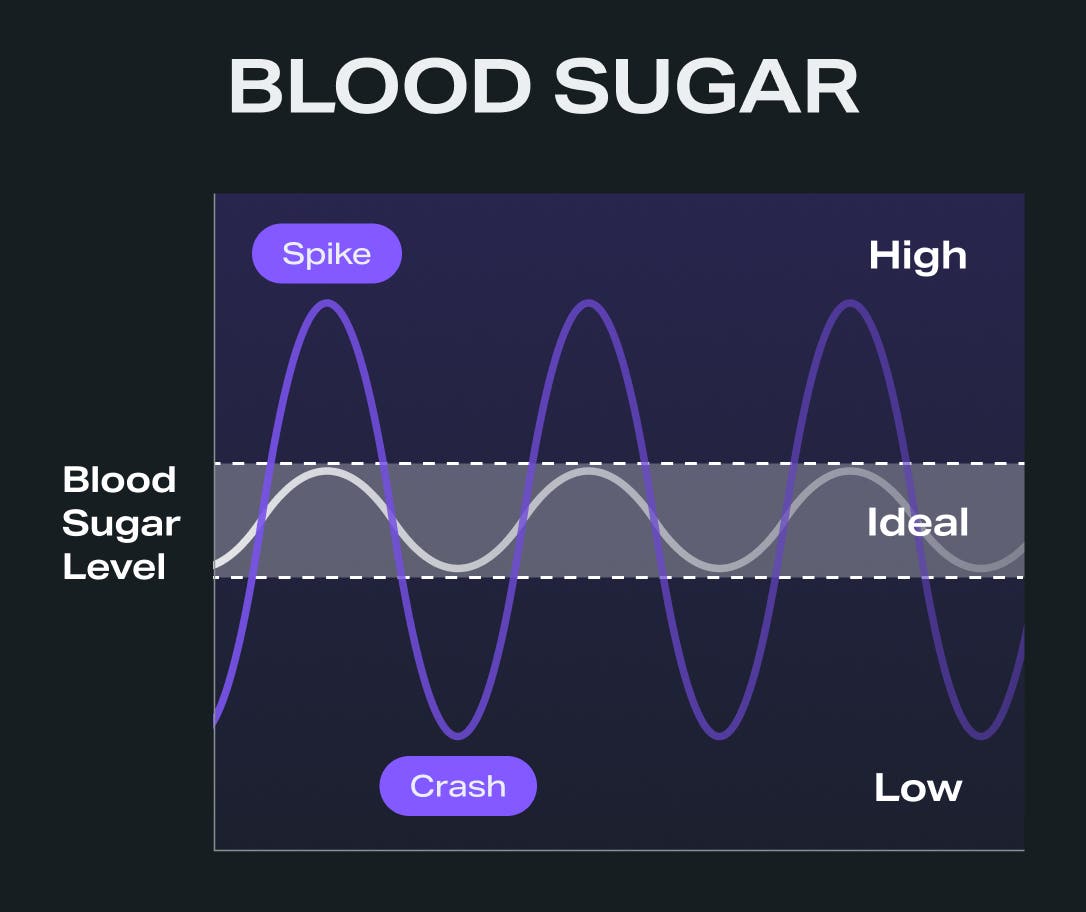When you think of junk food, you usually think of a particular food and the momentary pleasure it gives you when it reaches your lips. While these moments of indulgence can satisfy a craving, it’s important to understand how certain ingredients found in your favorite junk foods can increase your risk of illness and chronic disease when eaten regularly.
What’s more, they can interfere with some key processes that we as athletes need to maintain optimal body function impacting your performance, recovery, and overall health.
In this article, we’ll take a look at what junk food is, how it affects your health and performance, and what you can do to help limit your consumption. First, let’s break down what makes junk food unhealthy.
Highly processed
When food is processed, it is changed from its natural state with additives, preservatives, or artificial ingredients. These changes can make the food more appealing and taste better but also make it harder for the body to digest, especially as they are low in fiber.
A diet that is lacking in fiber can cause several unwanted symptoms that put a wrench in your training or competitions, like:
- Bloating
- Constipation
- Weight gain
- Fatigue
- Inflammation
- Low mood
- Poor heart health6
Calorie-dense
You’ve probably heard that junk foods are empty calories. This is because they can provide a burst of short-lived energy but offer little nutrition.
Most junk foods are high in sugar, unhealthy fats, or refined carbohydrates, leading to energy spikes, but lack the vitamins, minerals, and fiber your body needs to meet its demands. And these energy crashes can have a detrimental effect on your endurance and recovery.
Let’s break it down: when you eat a high-sugar or high-fat snack, blood sugar levels can rise rapidly. This triggers the body to produce a large amount of insulin. A rapid drop in blood sugar follows, causing an energy crash, quickly making you hungry and craving something sweet to increase your sugar levels. This kickstarts the process again.
Having a drop in blood sugar is totally normal and healthy. However, junk food can cause the body to overreact, leading to negative side effects.

Low nutrient value
When food is processed to improve shelf life, it often loses essential nutrients such as vitamins, minerals, and antioxidants — nutrients your body needs to repair tissue, boost immunity, and produce energy.
Without these nutrients, your body struggles to meet the demands of exercise and maintain overall health. A diet high in junk food can lead to nutrient deficiencies that not only slow muscle recovery but also weaken joints and connective tissue, increasing the risk of injury and illness.
Choosing nutrient-dense foods is the best way to support your body’s needs and stay on track to achieve your fitness goals.
High in sodium
Junk foods are known for being high in sodium and salt. Eating a diet high in salt increases your risk of high blood pressure, heart attacks, and strokes.1 It can also lead to dehydration, which as we all know, hydration is fundamental for all athletes.
Sodium is an important part of rehydrating following exercise.2 However, consuming too much salt or sodium within your overall diet can upset the hydration balance in the body, leading to muscle cramps, reduced endurance, and fatigue.3
High in refined sugars
Refined sugars have been stripped of beneficial nutrients during processing, leaving nothing but sweetness. This type of sugar, like white sugar, can cause insulin spikes and contribute to weight gain.4
Eating a lot of sugar regularly can make fat cells less responsive to insulin, increasing the risk of insulin resistance and developing type 2 diabetes. However, people who keep their added sugar intake below 5% of their total calories experience a 50% reduction in the likelihood of prediabetes or type 2 diabetes.5
For athletes, eating a lot of high-sugar foods can interfere with how muscles store energy, which is important for endurance and performance. In general, athletes are able to replenish their muscle energy quickly after exercise because their bodies absorb sugar from the blood easily.
But eating too much refined sugar over time can make the body less responsive to insulin, the hormone that helps move sugar into muscles. This makes it harder for muscles to store energy, which can hurt stamina and slow down recovery.

Unhealthy fat content
Many junk foods are rich in unhealthy fats like trans fats and saturated fats, which can raise bad cholesterol or low-density lipoproteins (LDL) in the blood while lowering good cholesterol. Over time, this increases the risk of heart disease and blocked arteries.
Athletes report that eating foods high in fat or sugar makes them feel lethargic, affects their physical performance, and could contribute to weight gain.7
Why do we get such strong cravings?
We’ve all experienced it – just one more chip, one last spoon full of ice cream. But what is it that makes junk food so difficult to resist?
You can thank the fat, sugar, and salt content in junk food for that. These ingredients play right into the reward and pleasure systems in the brain. When you eat junk food, your brain releases dopamine, a neurotransmitter or “happy chemical” that makes you crave more unhealthy foods. And so, you reach for that chip.
Junk foods have been designed to be highly palatable and engineered to taste good. They often bypass the body’s internal systems that make you feel full, leading to overeating and unhealthy food cravings. Your brain can become conditioned to craving these foods, which can cause a similar effect to other addictive substances.8
Long-term side effects vs. short-term side effects of junk food
The table below lists some of the short-term effects that regularly eating junk food can have on the body and how they can snowball into long-term consequences.
Effect | Short-term impact | Long-term impact |
Energy | Rapid energy spike followed by a crash | Consistent fatigue, endurance reduction, and craving more unhealthy food |
Mood | Temporary mood lift | Increased risk of developing anxiety and depression |
Digestive health | Bloating, digestion, constipation | Chronic digestive issues related to an imbalanced gut microbiome (IBS, inflammation) |
Blood glucose | A rapid increase in blood sugar levels and insulin spikes | Insulin resistance and type II diabetes |
Hydration | High sodium intake causes dehydration | Prolonged dehydration can lead to high blood pressure and increased risk of heart disease |
Heart health | Increases in blood pressure and heart rate | Risk of heart disease through bad cholesterol levels and increased risk of heart attack and stroke from fatty deposits in the blood vessels |
Weight | Bloating and water retention | Weight gain and risk of obesity |
Immunity | Poor nutrition and nutrient deficiencies resulting from a lack of nutrients | Frequent illness and infection |
Effects of unhealthy foods on mental health
Unhealthy foods, particularly those high in sugar and fat, can have a negative impact on mental health. They cause excessive blood sugar fluctuations, leading to mood changes, irritability, and tiredness.
Research has shown that regularly eating junk foods increases the risk of developing depression9 and psychological stress.10
The lack of important brain-boosting nutrients, including antioxidants and omega-3 fatty acids, may disrupt cognitive function and emotional well-being. For example, a low dietary intake of omega-3s is associated with an increased risk of dementia and cognitive decline.11
Junk foods change inflammatory pathways in the body, increasing oxidative stress and inflammation-related biomarkers. These biological changes can be linked to the development of mental health disorders and negatively impact training and physical performance.

6 Tips to reduce junk food consumption
Here are six ways you can cut down your junk food consumption and promote healthier choices:
- Meal prep: Preparing meals and snacks in advance will lower the temptation to grab unhealthy and convenient options when you’re hungry or pressed for time. Bonus – it can also save you money!
- Make healthy swaps: Swap out unhealthy snacks for healthier, nutrient-dense options like fruits, nuts, wholegrain crackers, and raw veggies. Have them prepared and accessible so sugary alternatives don’t tempt you.
- Get hydrated: If you’re craving something unhealthy, try drinking some water. Drinking enough fluid can temporarily curb your snack attacks by filling up your stomach until you find a healthier alternative.
- Prioritize protein: Include a mix of high-quality protein sources, like lean meat, poultry, tofu, and edamame, rather than high-calorie burgers or fried chicken. Eating high-quality proteins will keep you fuller for longer, limit obesity, and improve athletic performance and recovery.
- Catch some zzz’s: A bad night’s sleep can leave you craving junk food, fooling you into thinking it will give you an instant energy boost. Rock your night-time routine by incorporating some key sleep strategies. Better sleep will prompt you to make healthy food choices, and the positive cycle will continue.
- Choose healthy fats: Not all fats are bad – that’s simply a myth. Trans and saturated fats should be limited, but healthy fats, like those found in vegetable oils, avocadoes, and oily fish, are part of a healthy diet and should be consumed regularly. Fatty foods are best avoided a few hours before and after exercise because they slow digestion.
Let’s recap
Junk foods are tasty and can even feel addictive, but they also come with some pretty harmful side effects that can hinder your athletic performance and prove detrimental to your overall health when consumed regularly.
And while we’re all about enjoying life (and maybe a piece of cake or two), it’s incredibly important to strike a balance with a nutrient-rich diet that incorporates vitamins, minerals, and antioxidants.
Eating healthier doesn’t require an “all or nothing” mentality. Make simple healthy swaps and small lifestyle changes to limit junk food. Every action you take will help you reach your goals faster and keep you locked in the fitness game for the long haul.
Sources
[1] NHS. (2023). Salt in your diet. Available at: https://www.nhs.uk/live-well/eat-well/food-types/salt-in-your-diet/
[2] Valentine, V. (2007) ‘The importance of salt in the athleteʼs diet’, Current Sports Medicine Reports, 6(4), pp. 237–240. doi:10.1097/01.csmr.0000306477.87713.74.
[3] Carlton, A. and Orr, R.M. (2015) ‘The effects of fluid loss on physical performance: A critical review’, Journal of Sport and Health Science, 4(4), pp. 357–363. doi:10.1016/j.jshs.2014.09.004.
[4] Lean, M.E. and Te Morenga, L. (2016) ‘Sugar and type 2 diabetes’, British Medical Bulletin, 120(1), pp. 43–53. doi:10.1093/bmb/ldw037.
[5] DiNicolantonio JJ, O'Keefe JH. Added Sugars Drive Insulin Resistance, Hyperinsulinemia, Hypertension, Type 2 Diabetes and Coronary Heart Disease. Mo Med. 2022 Nov-Dec;119(6):519-523. PMID: 36588634; PMCID: PMC9762218.
[6] Barber TM, Kabisch S, Pfeiffer AFH, Weickert MO. The Health Benefits of Dietary Fibre. Nutrients. 2020 Oct 21;12(10):3209. doi: 10.3390/nu12103209. PMID: 33096647; PMCID: PMC7589116.
[7] Eck KM, Byrd-Bredbenner C. Food Choice Decisions of Collegiate Division I Athletes: A Qualitative Exploratory Study. Nutrients. 2021 Jul 6;13(7):2322. doi: 10.3390/nu13072322. PMID: 34371832; PMCID: PMC8308813.
[8] Garber, A. K., & Lustig, R. H. (2011). Is fast food addictive?. Current drug abuse reviews, 4(3), 146–162. https://doi.org/10.2174/1874473711104030146
[9] Ejtahed, H. S., Mardi, P., Hejrani, B., Mahdavi, F. S., Ghoreshi, B., Gohari, K., Heidari-Beni, M., & Qorbani, M. (2024). Association between junk food consumption and mental health problems in adults: a systematic review and meta-analysis. BMC psychiatry, 24(1), 438. https://doi.org/10.1186/s12888-024-05889-8
[10] Malmir, H., Mahdavi, F. S., Ejtahed, H. S., Kazemian, E., Chaharrahi, A., Mohammadian Khonsari, N., Mahdavi-Gorabi, A., & Qorbani, M. (2023). Junk food consumption and psychological distress in children and adolescents: a systematic review and meta-analysis. Nutritional neuroscience, 26(9), 807–827. https://doi.org/10.1080/1028415X.2022.2094856
[11] Wei, B.-Z. et al. (2023) ‘The relationship of omega-3 fatty acids with dementia and cognitive decline: Evidence from prospective cohort studies of supplementation, dietary intake, and blood markers’, The American Journal of Clinical Nutrition, 117(6), pp. 1096–1109. doi:10.1016/j.ajcnut.2023.04.001.